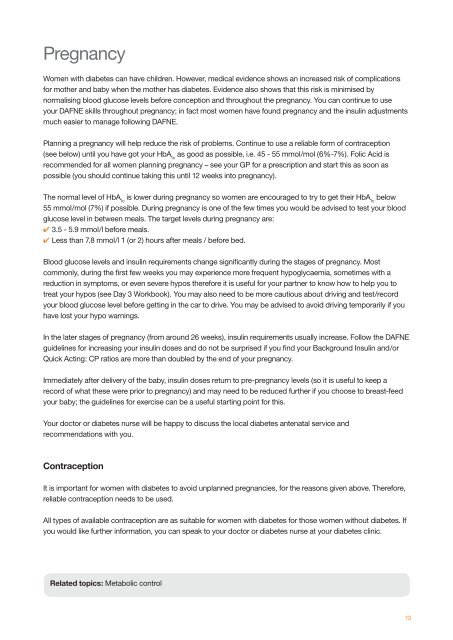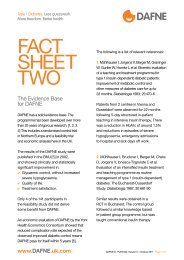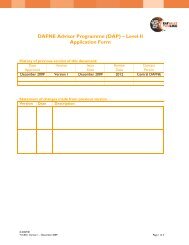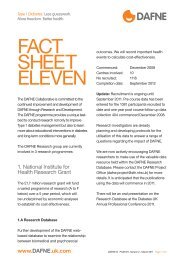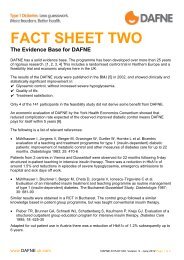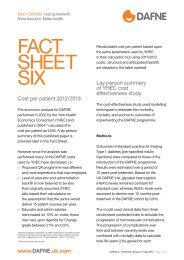FOR SHARON DAFNE wkbk day5 FINAL crops.pdf - Dafne - UK.COM
FOR SHARON DAFNE wkbk day5 FINAL crops.pdf - Dafne - UK.COM
FOR SHARON DAFNE wkbk day5 FINAL crops.pdf - Dafne - UK.COM
You also want an ePaper? Increase the reach of your titles
YUMPU automatically turns print PDFs into web optimized ePapers that Google loves.
Pregnancy<br />
Women with diabetes can have children. However, medical evidence shows an increased risk of complications<br />
for mother and baby when the mother has diabetes. Evidence also shows that this risk is minimised by<br />
normalising blood glucose levels before conception and throughout the pregnancy. You can continue to use<br />
your <strong>DAFNE</strong> skills throughout pregnancy; in fact most women have found pregnancy and the insulin adjustments<br />
much easier to manage following <strong>DAFNE</strong>.<br />
Planning a pregnancy will help reduce the risk of problems. Continue to use a reliable form of contraception<br />
(see below) until you have got your HbA 1c<br />
as good as possible, i.e. 45 - 55 mmol/mol (6%-7%). Folic Acid is<br />
recommended for all women planning pregnancy – see your GP for a prescription and start this as soon as<br />
possible (you should continue taking this until 12 weeks into pregnancy).<br />
The normal level of HbA 1c<br />
is lower during pregnancy so women are encouraged to try to get their HbA 1c<br />
below<br />
55 mmol/mol (7%) if possible. During pregnancy is one of the few times you would be advised to test your blood<br />
glucose level in between meals. The target levels during pregnancy are:<br />
✔✔3.5 - 5.9 mmol/l before meals.<br />
✔✔Less than 7.8 mmol/l 1 (or 2) hours after meals / before bed.<br />
Blood glucose levels and insulin requirements change significantly during the stages of pregnancy. Most<br />
commonly, during the first few weeks you may experience more frequent hypoglycaemia, sometimes with a<br />
reduction in symptoms, or even severe hypos therefore it is useful for your partner to know how to help you to<br />
treat your hypos (see Day 3 Workbook). You may also need to be more cautious about driving and test/record<br />
your blood glucose level before getting in the car to drive. You may be advised to avoid driving temporarily if you<br />
have lost your hypo warnings.<br />
In the later stages of pregnancy (from around 26 weeks), insulin requirements usually increase. Follow the <strong>DAFNE</strong><br />
guidelines for increasing your insulin doses and do not be surprised if you find your Background Insulin and/or<br />
Quick Acting: CP ratios are more than doubled by the end of your pregnancy.<br />
Immediately after delivery of the baby, insulin doses return to pre-pregnancy levels (so it is useful to keep a<br />
record of what these were prior to pregnancy) and may need to be reduced further if you choose to breast-feed<br />
your baby; the guidelines for exercise can be a useful starting point for this.<br />
Your doctor or diabetes nurse will be happy to discuss the local diabetes antenatal service and<br />
recommendations with you.<br />
Contraception<br />
It is important for women with diabetes to avoid unplanned pregnancies, for the reasons given above. Therefore,<br />
reliable contraception needs to be used.<br />
All types of available contraception are as suitable for women with diabetes for those women without diabetes. If<br />
you would like further information, you can speak to your doctor or diabetes nurse at your diabetes clinic.<br />
Related topics: Metabolic control<br />
13<br />
<strong>DAFNE</strong> <strong>wkbk</strong> <strong>day5</strong>.indd 13 06/08/2010 13:23


